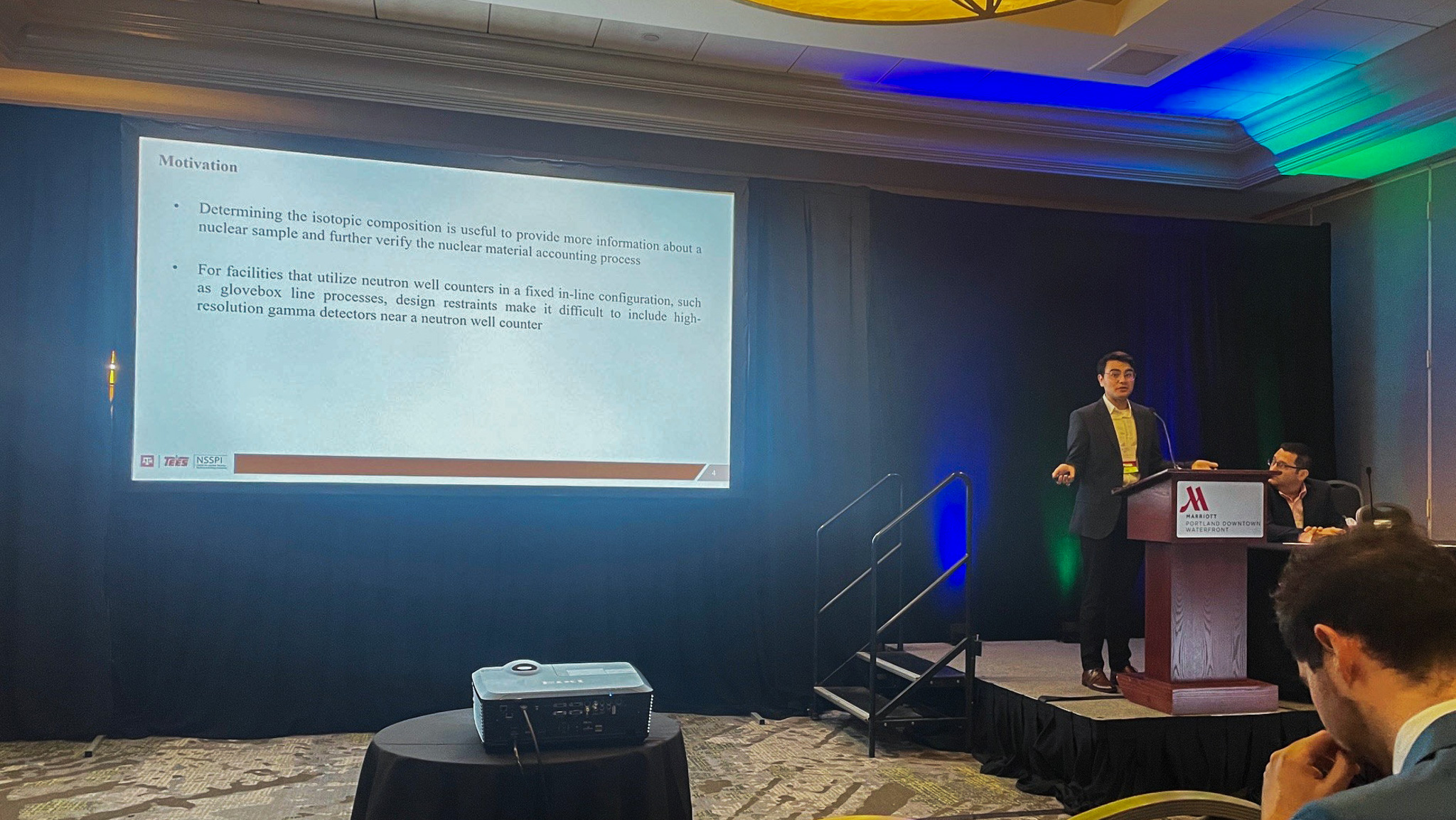
Student researchers in Texas A&M’s Center for Nuclear Security Science and Policy Initiatives (NSSPI) brought home three first-place awards for their research presentations at a conference last month.
Texas A&M students and faculty, many of whom are affiliated with NSSPI, traveled to Portland, Oregon, on July 21 – 25 for the 65th annual meeting of the Institute of Nuclear Materials Management (INMM). The meeting featured seminars from students, faculty and representatives from national laboratories about nuclear non-proliferation. This year, three students from Texas A&M won awards at the conference.
“It’s gratifying to see the success of all our students at the INMM meeting,” said Texas A&M nuclear engineering professor and interim NSSPI director Craig Marianno. “NSSPI has a long history of student participation at the INMM and I’m happy to see the tradition continue.”
Seungwoo Son, a graduate student working with Texas A&M nuclear engineering professor Farheen Naqvi, won the student poster award for the Nonproliferation and Arms Control Division. His research uses computer simulations to determine the feasibility of a mobile isotopic identification method, nuclear resonance transmission analysis (NRTA), that uses a californium neutron source.
Two students — John Corder, a graduate student working with Marianno, and Dylan Frank, an undergraduate student working with Naqvi — tied for first place for the student paper award in the Materials Control and Accountability Division.
Frank said when he and Corder made their way to the award ceremony, someone approached Corder to inform him that he had won. Then, the same person told Frank that he had won as well. Together, Frank and Corder walked into the conference room full of people congratulating them both.
It's a great opportunity to get exposure to what other people are doing in the field, not just in your own subject, but to have a broader overview. By doing that, students get a different perspective to solve their own problems, and also get to talk to their peers and network.
“It felt great to win an award,” Corder said. “It was a very awesome experience to present my work and see people interested, as well as providing useful feedback and advice for next steps.”
Frank presented his work on creating a computer program that can track radioactive material within a facility with high background radiation levels to ensure that the material hasn’t been lost or stolen. Corder’s research focused on adding gamma detectors to traditional neutron well counters when accounting for nuclear material.
Grace Long, who is also a student with NSSPI, and Zavier Ndum Ndum also presented their work at the INMM meeting. Long presented her work on studying the effect of neutron-absorbing control elements in used fuel on measurements from advanced experimental fuel counters. Ndum presented his work on creating and testing a prototype for monitoring the effects of radiation on biological tissue in space travel and medical applications.
Attending events such as the INMM meeting is a valuable experience for students. Presenting their research lets the students practice their presentation skills and learn how to appeal to a broad audience, Frank said. It also gives them an opportunity to network with peers and learn about the latest research in different fields. Talking about research with other people can also bring unexpected opportunities, Corder said.
“It's a great opportunity to get exposure to what other people are doing in the field, not just in your own subject, but to have a broader overview,” Naqvi said. “By doing that, students get a different perspective to solve their own problems, and also get to talk to their peers and network.”
Son’s experience at the INMM meeting exemplifies these opportunities. Even though English is his second language, Son said any potential language barrier seemed to melt away when he discussed his research ideas with colleagues.
When he explained how NTRA is different from other isotope identification methods, it prompted many questions about his work. For example, people asked about drawbacks to his simulations and mentioned other types of detectors, which gave him some ideas to solve problems he had faced.
“I could find more clues with my simulations, and I could also make more connections with different people trying to use NTRA and other techniques to make progress on non-proliferation,” Son said. “It was a great opportunity to meet other people who have different experiences, and I can make more progress on my simulation and my thesis.”